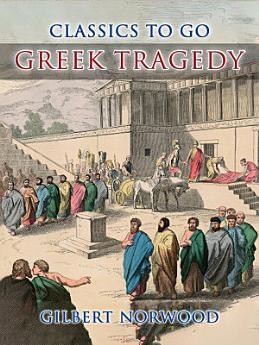Greek Tragedy
Sep 2024 · Otbebookpublishing
Ebook
570
Pages
family_home
Eligible
info
reportRatings and reviews aren’t verified Learn More
About this ebook
Gilbert Norwood's "Greek Tragedy" explores the essence and enduring legacy of ancient Greek theatrical works, illustrating their pivotal role in shaping literature. The book examines the core themes of fate, divine intervention, morality, and human suffering, emphasizing their relevance to contemporary society. Norwood's analysis reveals how these ancient plays resonate with modern audiences, offering profound insights into the human condition.
Greek tragedy's exploration of fate and free will provokes thought on current debates about determinism and autonomy. The inexorable forces that drive characters, like Oedipus's tragic discovery or Antigone's defiance, mirror today's struggles with societal and existential crises. These themes are pertinent to discussions on mental health, showing how recurring personal and societal conflicts impact individuals.
Norwood also dissects the function of divine will in tragedies, fostering dialogue on the role of belief systems and ideologies in contemporary life. The portrayal of gods and fate raises questions about the balance between faith and personal responsibility, echoing today's discussions on religious influence in politics and ethics.
Furthermore, issues of justice and moral ambiguity in Greek tragedies reflect modern legal and social justice movements. Characters confronting moral dilemmas, such as in "The Oresteia," parallel present-day battles over ethical decision-making and justice reform.
Norwood's meticulous breakdown of Greek tragedies showcases their dramatic and literary impact while linking their themes to contemporary issues. This connection emphasizes the timelessness of these ancient narratives and their significance, illustrating how classical insights can inform and enrich modern understanding of complex societal and personal dilemmas.
Greek tragedy's exploration of fate and free will provokes thought on current debates about determinism and autonomy. The inexorable forces that drive characters, like Oedipus's tragic discovery or Antigone's defiance, mirror today's struggles with societal and existential crises. These themes are pertinent to discussions on mental health, showing how recurring personal and societal conflicts impact individuals.
Norwood also dissects the function of divine will in tragedies, fostering dialogue on the role of belief systems and ideologies in contemporary life. The portrayal of gods and fate raises questions about the balance between faith and personal responsibility, echoing today's discussions on religious influence in politics and ethics.
Furthermore, issues of justice and moral ambiguity in Greek tragedies reflect modern legal and social justice movements. Characters confronting moral dilemmas, such as in "The Oresteia," parallel present-day battles over ethical decision-making and justice reform.
Norwood's meticulous breakdown of Greek tragedies showcases their dramatic and literary impact while linking their themes to contemporary issues. This connection emphasizes the timelessness of these ancient narratives and their significance, illustrating how classical insights can inform and enrich modern understanding of complex societal and personal dilemmas.
About the author
Gilbert Norwood (1880–1954) was a distinguished British classical scholar and literary critic, best known for his expertise in ancient Greek drama. A professor of classics at the University of Toronto, Norwood made significant contributions to the study of Greek literature, particularly in his analysis of tragedy. His work, *Greek Tragedy*, is considered a seminal text in the field, offering a comprehensive examination of the themes, structure, and cultural significance of ancient Greek plays.Norwood's scholarly approach was marked by his deep understanding of both the historical context and the dramatic artistry of Greek playwrights like Aeschylus, Sophocles, and Euripides. He sought to bridge the gap between academic study and broader literary appreciation, emphasizing the enduring relevance of Greek tragedies to modern audiences. His interpretations often highlighted the emotional and psychological depth of these works, connecting ancient themes of fate, morality, and human suffering to universal human experiences.Beyond his work on Greek drama, Norwood contributed to classical studies with a range of essays and lectures, influencing both students and fellow scholars. His legacy endures in the field of classical literature, where his insights into Greek tragedy remain influential in understanding the genre's timeless power.
Rate this ebook
Tell us what you think.
Reading information
Smartphones and tablets
Install the Google Play Books app for Android and iPad/iPhone. It syncs automatically with your account and allows you to read online or offline wherever you are.
Laptops and computers
You can listen to audiobooks purchased on Google Play using your computer's web browser.
eReaders and other devices
To read on e-ink devices like Kobo eReaders, you'll need to download a file and transfer it to your device. Follow the detailed Help Center instructions to transfer the files to supported eReaders.






